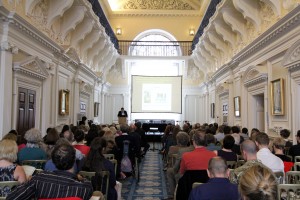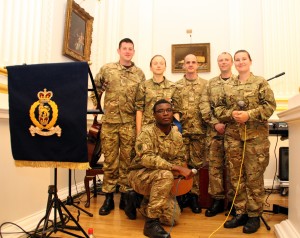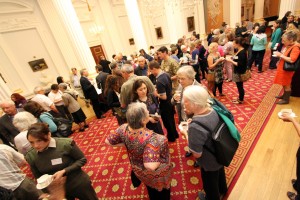
JKP author Julie Sutton was invited to speak at the Worlds in Collision: Music and the Trauma of War conference held in London’s Mansion House at the end of June. In this interview, she describes her experiences of working in the areas of trauma and conflict after the Bosnian war and the many diverse and inspiring approaches for dealing with the results of trauma covered by different speakers at the event. She also explains why her upcoming book, co-authored with Jos De Backer, will focus on promoting an awareness of an integration of musical thinking and theories of the mind.
How did you originally become involved in speaking at this conference? What does the theme of the conference mean to you personally?
I was invited because of my experience in the areas of music therapy, conflict and trauma. During the immediate ceasefire relating to the Bosnian war, I was invited by Prof Nigel Osborne and Ian Ritchie to visit Mostar and Sarajevo, to discuss the possibility of using the shell of a building in Mostar to build a music centre, including a music therapy department. They were interested in me because of my experiences in Belfast during the conflict, and my publications and conference presentations relating to psychological trauma (e.g. my work leading up to the book Music, Music Therapy & Trauma, which was the culmination of a Millennium Award I received). This first visit to Bosnia made an enormous impression on me, when I met some extraordinary people who were living in circumstances beyond the ordinary.
To make this trip from Belfast only served to heighten this experience and particularly to see what had happened to Mostar, a city with two different religious groups. While Belfast had and was still experiencing violent, destructive events, in Mostar I discovered how a functioning society that had been providing a full education programme for its children was now struggling to maintain and support its population, as well as trying to come to terms with the horrific impact of war. The special school children and staff I met and worked with were based in a bombed out hotel. Another school building was being shared by three different schools on a daily rota system. The memory of the extent of the destruction in Mostar and Sarajevo and its effect on the people I met stays with me to this day.
The Pavarotti Music Centre then grew out of the ruins of the building I had seen and music education, therapeutic experiences of music and music therapy were provided. I learned a great deal from this first visit to Bosnia, and from being a consultant for the Pavarotti Centre across a number of years, and working with the music therapists who were based there and who had travelled from different areas of Europe and N. America to take on the work. Because of this link, I had a very personal connection with this particular conference.

Could you describe a little bit about the day at the conference itself – what did you particularly enjoy or find interesting or surprising about any of the presentations and discussions?
I attended the first day of the conference. Perhaps the most striking thing about the day was the range and diversity of approaches to the trauma of war, such as from psychiatry, psychology and applied psychological approaches such as music therapy. To have eminent speakers providing an interdisciplinary perspective is always a rich experience, but at this conference there was also the involvement of the army, who began the day with a lively presentation by Major Guy Booth, about the work of the Band of the Adjutant General’s Corps. The Band has a number of contemporary ensembles supporting both civilian and military events, including playing for soldiers in fields of war. As well as enjoying and being touched by the music they played, it created a different atmosphere to have serving soldiers as part of the audience, and also knowing that these were musicians as well as soldiers. Through their own experiences, these young men and women also knew about the therapeutic impact that music can have, in ways that speak more deeply and directly to us than the very necessary and valuable research and theory building.
Your upcoming book, co-edited with Jos De Backer, will emphasise how essential the music is within music therapy. Was this a theme covered by many of the other speakers at the conference and why do you think this is such a crucial aspect of music therapy?
Jos and I believe that there should be awareness of an integration of musical thinking (detailed awareness and experiences of music in the clinical setting as well as the therapist’s own awareness of their musical identity) and theories of the mind (mental structures, in particular a psychodynamic frame of thought that connects the mind to the body,). My contribution to this conference was from this stance, something that acknowledges and also goes beyond neurological ideas, developmental theories or a medical music therapeutic approach to trauma.
We know that music exists on the same level where the central difficulties experienced by psychiatric patients can be located. The relationship between music and psychopathology gives music therapy a crucial place in the treatment of psychiatric patients. A detailed and layered thinking about the impact of music upon us and upon psychopathology is at the centre of our thinking.
In our book we describe clinical material that demonstrates the fundamental significance of therapists’ listening to and thinking about music. While many authors have written about the art and science of music therapy, we propose to detail the central musical components of the work of a music therapist, as this is integrated into clinical practice. Some presenters at the conference did give information and included literature and research from psychology and neurology in relation to the brain and music, but apart from my paper there was no mention of the kind of integration that Jos and I focus on in our book. We hope very much that the book will serve as a first platform for this way of thinking about music and music therapy in this integrated way, as practiced in countries across Europe.

Can you explain a little bit about your talk and how music therapy has been used in ‘the theatres of war?’
There is not sufficient space to summarise the complexities of this area here, because when one is living within a ‘theatre of war’, one is at both a physical and emotional limit (and at times beyond) what the human embodied mind can manage. These are experiences beyond the ordinary, and which take us to the edges of what it is possible to experience and process. It is impossible not to be affected by these experiences. Because music is an incredibly powerful medium, speaking so directly to the body and mind, I believe it should be used with great caution and delicacy for those post-traumatised. A detailed and careful theoretical integration of theories of music and theories of mental structures (the mind in action) is thus essential. For my presentation I focused on one aspect, on experiences of time in the consulting room, where both patient and therapist may have varying senses of themselves in or out of time. I explore this further in a chapter in our book, because it is also one central aspect of music, and another way of thinking about what music therapy can bring as a treatment for those in distress.